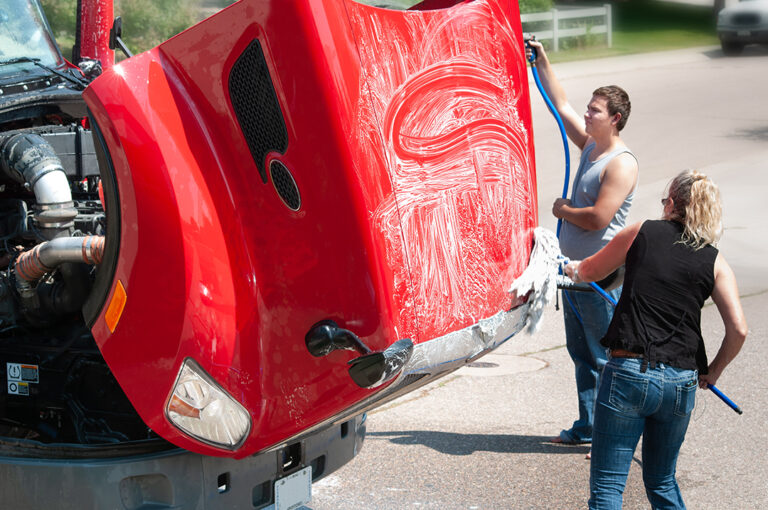DOWN AND DIRTY: KILLING THE CORONAVIRUS AND OTHER GERMS
To date, scientists haven’t come up with a guaranteed method of killing the coronavirus. As mentioned in the previous articles of this series, the best available advice is hand-washing and using hand sanitizer. But how should you do all you can to sanitize your truck? The answer is multipronged, as you need to eliminate bacteria, viruses, mold and allergens, all of which infest your truck, inside and out.
Mold and allergens are among the most common but difficult germs to eradicate. If you are allergic to something in your cab, chances are you already know it. But there are plenty of undetected allergens and spores growing under your seat or in your sleeper. Mold and allergens can often be found on dashboards. Disinfecting wipes are offer a quick and simple ways to combat germs on the dashboard and other hard surfaces. Your cab’s air filters are important in fighting these types of germs, so make sure you replace and/or clean them at recommended intervals. If the infestation is especially bad, you may need to consider cleaning your cab’s air circulation system.
Auto Loan Solutions has posted a handy fact sheet at www.autoloansolutions.ca/blog/4-tips-to-kill-germs-in-your-car that addresses the many places germs can be found in vehicles, from the steering wheel to knobs and controllers, upholstery, the ventilation system and even car keys. All of these apply to trucks as well, only trucks have larger surfaces. Likewise, with special systems and equipment, most trucks have disinfecting needs beyond those listed for automobiles. For starters though, consider the following next time you decide if it’s time for a thorough inside and outside detailing job for your truck.
To begin, consider where germs tend to hide. The Auto Loan Solutions fact sheet reiterates that germs are found almost anywhere. Life is never germ-free.
Where germs ‘hide’ in broad daylight
The keys to your truck’s ignition host many germs. They spend a lot of time in spots that harbor high concentrations of germs — your hands and your pockets. Think about what you carry in your pockets. If you stick your keys inside, they become covered with all the germs of every item carried, and a standard washing of pants or jackets will not necessarily kill germs imbedded in the fabric. If another driver uses your truck, consider the unknown places they have been and the items in their pockets. When you retrieve the keys to your truck, you also retrieve the attached germs. Wash and sanitize those keys frequently.
Airborne germs are another major concern. These germs aren’t nearly as easy to battle. Cleansing the air is not an easy chore. You can see grease on your door handle, but airborne dirt is more difficult to recognize. Some tips for keeping cabin air clean are to let your windows down on occasion and adjust your vents to allow outside air to enter your cabin. Recirculating contaminated air only causes more germs to grow. Again, if you cab has an air filter attached to the air conditioning or heating system, replace it at recommended intervals.
When it comes to carpet, seats and upholstery, you probably realize when you drop food crumbs on the floorboard or on or under your seat. But by the time you get to a location where it’s safe and convenient to clean them up, you’ve likely forgotten. Over time, these crumbs get ground as finely as flour and become nearly invisible. Like any organic matter, food encourages growth of mold, bacteria and other germs. Once germs get kicked around the cab and some become airborne, the they can literally infest you truck. On another front, if you have children and carry them in a car seat in your personal vehicle when off work, take note. Studies show that children’s car seats, like fuel-pump handles, carry double the number of germs normally found on a toilet seat.
Another area that germs find accommodating — and that you cannot avoid touching as a driver — is your truck’s “operation center.” The door handles, buttons and controls in your truck hold more germs than any other part of vehicle, at least in terms of parts you regularly touch. Germs love to be in control, so what better surface to infest than a steering wheel? A study reported steering wheels host up to 700 species of bacteria, depending on the type of material and any covering. Recommendations include driving with gloves or keeping hand sanitizer handy, especially if you share driving duties with someone else. Likewise, anywhere passengers tend to touch (door handles, radio controls, etc.) should be sanitized frequently.
Cleaning Methods
There are literally thousands of cleaning solutions and cleaning machines on the market. Before using any of them, make sure they are appropriate for the surfaces in your truck. Also, make sure you aren’t using something that is merely giving your germs a bath. You don’t want clean germs; you want them to die.
First, brush and vacuum your cab top to bottom. A monthly vacuuming is recommended, but in the face of the coronavirus, the more frequent the better. Next, you need to reach the tiny particles such as pollen, dust and other that escape the vacuum. Shampoo your upholstery on occasion. A good shampoo can wipe out a lot of germs.
Disinfecting you cab may be the most important step in cleaning. Germs that are difficult to eradicate may not stand a chance against a good disinfectant. Wipes and disinfectants designed specifically for use in trucks are available.
Keep in mind, the performance of your truck isn’t just based on gross weight and horsepower. Its operation also depends on your abilities as a driver. If you have a cold, the flu or any other illness, you aren’t going to operate at top speed or efficiency. Keeping your truck clean is something you can do to remain comfortable and in control.
Beyond hygienic care
No matter how often or how long drivers wash their hands, and even if they employ a company such as EZFill to fuel their trucks, nothing offers 100% certainty when it comes to germs, especially those like the coronavirus, for which a scientifically based disinfectant has yet to be confirmed.
While the coronavirus is a hot topic worldwide and a growing concern in the U.S. since early this year, analysts are just now recognizing its impacts on cargo and freight movement. Airlines, cruise ships and even Amtrak have canceled or reduced flights, cruises and travel along specific routes.
The impact of the virus in transportation is becoming very visible. The ports of Long Beach, Los Angeles, Oakland, Seattle and other cities that are normally filled with ships at dock, others waiting to dock, and longshoremen offloading intermodal containers and freight are virtually silent. Some companies have circulated photos showing a few trucks waiting cargo to arrive from China, Japan, South Korea, and other Asian countries, and that cargo may never arrive. On the East Coast, the ports of Savannah and Miami, which only recently experienced dramatic increases in freight due to the widening of the Panama Canal, are seeing activity dwindle. For now, measuring the actual impact of the canal-widening project will have to wait until the coronavirus is no longer infecting the data.
Whether rigs are hauling intermodal containers or are loaded with goods for distribution centers, port activity plays an enormous role in the health of the trucking industry. What happens on the docks of port cities directly impacts the demand for trucks and drivers throughout the country. Demand levels and orders not yet arriving at U.S. ports are slowly appearing in statistical reports. A lot of information has been published about the effects of the coronavirus on imports, but most relates to statistics and economic impact data, information someone lacking analytic skills related to the trucking industry is likely to overlook. But when one drills through the data and allows the impact on truck drivers to be recognized, anxiety builds.
The human impact of the coronavirus related to jobs and how decreased imports affect industry and business from coast to coast have received widespread attention only over the last few days. But signs of those impacts are everywhere. Events no one ever dreamed could be canceled will wait another year to resume. A city like Seattle will likely go through an extended period before residents are confident and comfortable visiting stores and meeting new people. Online giants such as Facebook and Amazon have sent employees home if their duties can be completed from remote locations, and many analysts suggest that once executives recognize the benefits, the employees may be told to continue working remotely.
As a truck driver, “working from home” most often means driving your truck. The impact of the coronavirus on the trucking industry may be as important a challenge facing governmental officials as any other. But if you’ll do your small part to protect yourself and your truck from accumulating germs, collectively the nation’s trucking industry can greatly help officials strike a balance between protecting public health and preserving the nation’s economic stability.
Since retiring from a career as an outdoor recreation professional from the State of Arkansas, Kris Rutherford has worked as a freelance writer and, with his wife, owns and publishes a small Northeast Texas newspaper, The Roxton Progress. Kris has worked as a ghostwriter and editor and has authored seven books of his own. He became interested in the trucking industry as a child in the 1970s when his family traveled the interstates twice a year between their home in Maine and their native Texas. He has been a classic country music enthusiast since the age of nine when he developed a special interest in trucking songs.











